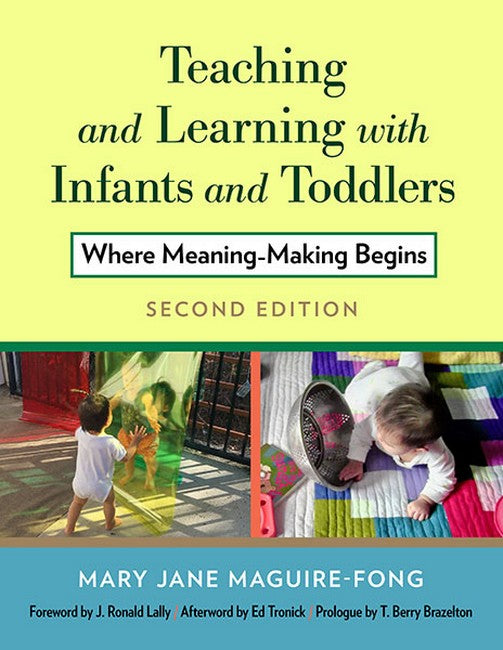Mary Jane Maguire-Fong is professor emerita of early childhood education at American River College in Sacramento, California, and co-author of Infant Development from Conception to Age 3: What Babies Ask of Us.
Request Academic Copy
Please copy the ISBN for submitting review copy form
Description
- Foreword to the First Edition J. Ronald Lally
- Prologue to the First Edition T. Berry Brazelton
- Preface
- Part I. How Infants Learn
- 1. Infants as Active Meaning-Makers
- Infants Are Born Researchers
- Infants as Subjects, Not Objects
- A Triangle of Relationships from Research to Practice: Education Begins in Infancy
- 2. Relationships Shape the Developing Brain
- Sequence of Brain Development
- Experience Wires the Brain
- Neurons and How They Work
- Brain Plasticity: Benefit and Risk
- The Social Brain
- From Research to Practice: Building Strong Brains
- 3. Knowledge from the Infants Point of View
- Three Types of Knowledge
- Learning Within Three Contexts
- From Research to Practice: Naming Knowledge in Infancy-Foundations for Learning
- 4. Policies That Support Relationships
- Primary Care
- Continuity of Care
- Small Group Size
- Culturally Respectful Care
- From Research to Practice: Reflective Supervision
- PART II. OBSERVING, DOCUMENTING, AND INTERPRETING TO SUPPORT INFANT LEARNING
- 5. Observing: Where Teaching and Learning Begin
- Observing, Documenting, and Interpreting
- Documentation that Supports Curriculum Planning
- Documentation to Assess Learning
- Documentation to Engage Families
- From Research to Practice: Re-visioning Curriculum
- 6. First Feelings
- Attachment
- How Babies Respond to Stress
- Proposing Possibilities for Learning
- From Research to Practice: Infant Mental Health
- 7. Sense of Self and Other
- Born Looking for Us
- Holding Others in Mind
- The Withdrawn Infant
- Caring and Cooperating
- Proposing Possibilities for Learning
- From Research to Practice: Shared Silent Stories
- 8. Taking Action: Motor Development
- Rising Up: Rotating, Sitting, Standing
- Moving Out: Locomotion
- Grasping
- Perceptual and Motor Challenges
- Proposing Possibilities for Learning
- From Research to Practice: Where Babies Find Themselves
- 9. Thinking: Cognitive Development
- Infants Investigate
- Infants Build Concepts
- Proposing Possibilities for Learning
- From Research to Practice: How Do We Know They Are Learning?
- 10. Communicating: Language Development
- Babies Seek Patterns in Language
- How the Brain Organizes Language
- Language Learning: A Shared Social Experience
- The Emergence of Speech
- Proposing Possibilities for Learning
- From Research to Practice: Literacy Begins in Infancy
- Part III. Contexts for learning
- 11. Play Spaces: Contexts for Wonder and Learning
- Play Spaces with Distinct Identity
- Familiarity and Surprise
- Seclusion
- Pathways To, Not Through, The Play
- Outdoors as a Learning Environment
- Safety, Sanitation, and Comfort
- 12. Care Routines: Contexts for Joy and Learning
- Welcoming, Peaceful Spaces for Care
- Care That Invites Participation
- Meals as Invitation to Participate
- Diapering as Invitation to Participate
- Napping as Invitation to Participate
- 13. Conversation and Interaction: Contexts for Learning
- Respectful Guidance
- Acknowledge Feelings or Intent
- Clear Limits: Convey the House Rules
- Frame a Limited Choice
- Temperament: A Goodness of Fit
- Touchpoints
- Difficult Behavior: A Child Seeking Safety
- 14. Who Cares for Babies?
- Access to Quality Infant Care
- Documentation as Tool for Advocacy
- Afterword to the First Edition Ed Tronick
- References
- Index
- About the Author

